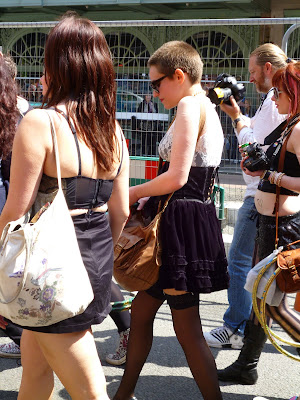
"I don't want to grow up" said 8-year-old Courtney as she lay on her hole-ridden bed, scratching her eczema-scarred ankle. Because for her and 3.5 million other children in the UK living in poverty, growing up only means the stress of struggling to feed a family on less that £70 a week and getting into debt. Courtney's mum can't even afford a bus fare, a sobering fact that has resigned Courtney to believe that she will “always be poor”, unlike her friend whose parents both have jobs and can afford holidays to Greece.
In another scene, Sam, an eloquent 11-year-old, reveals many of the compounding effects of being poor. He is bullied at school for wearing his sister’s second-hand uniform and called “mop-head” because his dad can’t afford to take him to a barber’s. He eventually does get his hair cut for £9 as a 12th birthday present, as well as a card. He knows the value of money; for him £1 means 6 hours of TV, paid on a meter. He doesn't want to have a wife, because "she might leave me", as his mum did on his second birthday.
Paige, who lives with her parents in a high-rise flat in Glasgow, points out the damaging effect of damp on the health of children living below the poverty line as she covers her mouth in disgust, looking up at the blackened ceiling of her friend’s bathroom.
It seems unbelievable that so many children and their families must live in such unsuitable accommodation while thousands of houses lie boarded up and empty across Britain, which should surely be renovated and given to families in need.
The responsibility for increasing the opportunities of poorer children lies with many people; local authorities, parents, schools and the government all have their role to play. Admittedly, the provision of free swimming, free family planning clinics, and free bus rides in deprived areas has increased, and libraries have always been places to access books and computers for free.
However, these services are rendered redundant if parents do not know how to access them, or schools do not take advantage of publicizing them.
And as for the government…well, the protests against the cuts only touched the surface of their irresponsibility. When in East Lancashire recently, I attended a community debate in a community centre that was going to be shut down owing to the cuts. The children there were extremely vocal about the damaging effect the closure would have. Not only would it would remove a place they could relax and play in, but they also believed it would reinforce stereotypes of hooded, criminal-minded teenagers hanging out on street corners, and thereby increase tensions and mistrust within the community, further impeding people's abilities to work together tho improve their community.
Poverty is not just lacking money. It pervades and cripples so many other areas of life; health, education, social inclusion, and in particular one's sense of one’s own prospects and future.
Organizations like
Kid's Company are doing great work to tackle the traumatic effects of poverty and support children to grow into independent, secure adults. But we should also think about how we can do our bit, whether through lobbying MPs, supporting charities, setting up free after-school clubs at the local library or contacting schools to inform them about free facilities in the area.
It's documentaries like this that really make me want to get onto
Teach First...fingers crossed.













